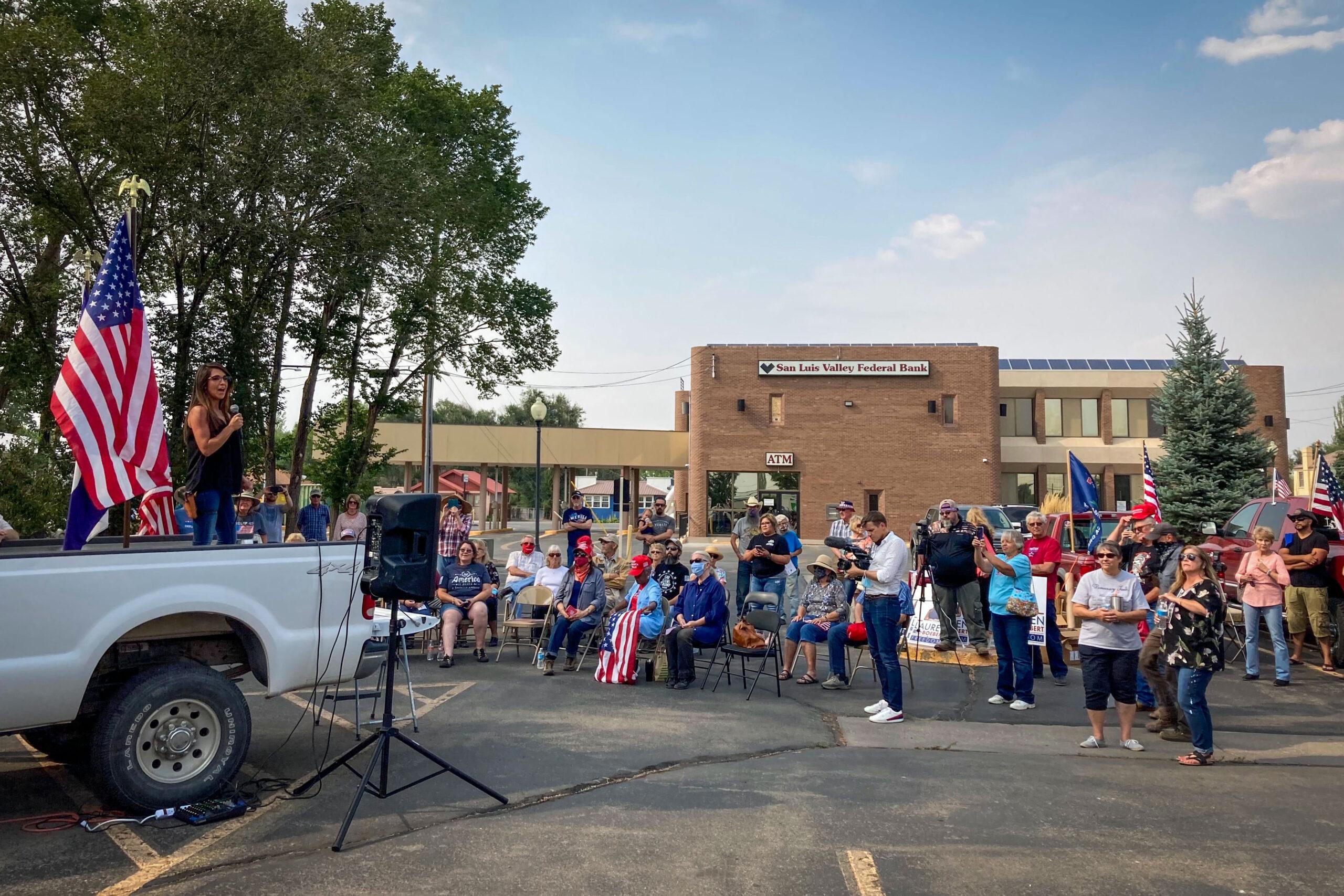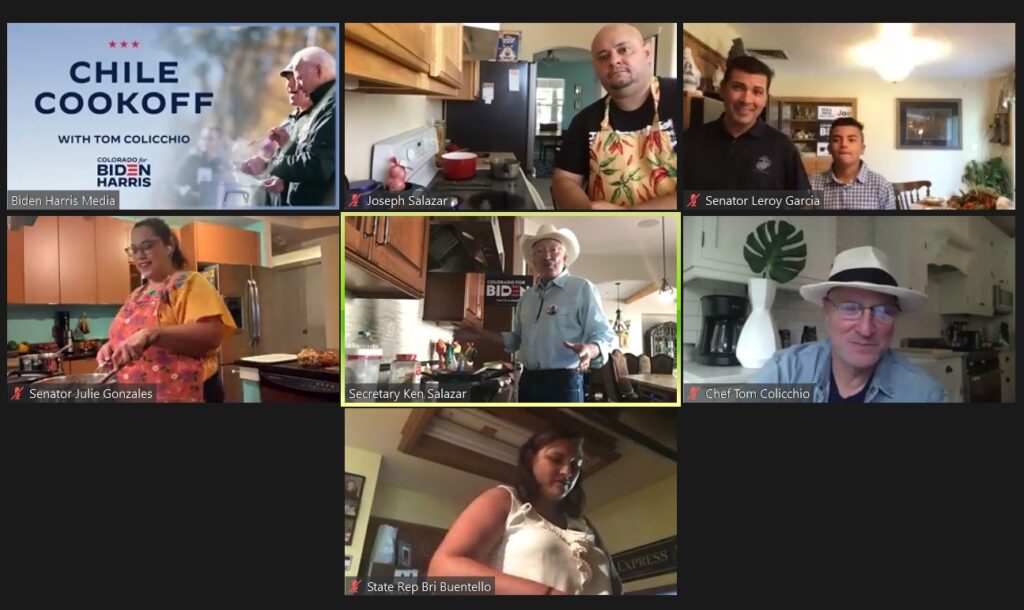
Call it a Tale of Two Campaign Seasons.
This year, the ground game — how campaigns reach out and engage with voters — is both familiar and yet vastly different due to the coronavirus pandemic.
The elements of the familiar are still there, especially for the Republican Party in Colorado. Candidates address raucous — if smaller and more spread out — crowds at campaign stops, while an army of volunteers man phone banks and knock on doors to talk to voters.
Some of those door-knockers are working with Americans for Prosperity Action in Colorado, a conservative-libertarian PAC backed by the Koch brothers, which has been canvassing for Republican Cory Gardner in the U.S. Senate race.
Jesse Mallory, an advisor for the group, said they’re taking precautions. “Everyone has a mask, everyone has hand sanitizer. And if you go to a door, you knock and then we encourage them to step 6 feet back and have a conversation with them.”
Meeting voters in person makes it easier to read body language and facial cues — to help a canvasser know what points are landing or where to steer the conversation.
The Colorado GOP has built out a huge field team across the state, according to communications director Joe Jackson.
“From RNC to Trump campaign to Colorado GOP here, the last several years is really building out a deep bench of people across the state that can go out and volunteer,” he said.
According to Jackson, Republicans have made 4 million contacts with voters across the state, including knocking on over a million doors. He’s been out canvassing with volunteers, too, and said the response has been good.
“Everyone was super happy to see us. Wanted to chat about schools and coronavirus and the Great American Outdoors Act,” he recalled.
He said the precautions they’ve put in place due to the pandemic seem to be working, so they will forge ahead with the traditional trappings of the campaign trail — in-person events, neighborhood canvassing, phone-banking — to gin up enthusiasm and turn out the vote.
“I think that will be the key difference come November between winning and losing,” Jackson said of the strategy.
But Democrats are betting on a different approach during these uncharted times.
“Nothing actually replaces an actual one-on-one conversation with a voter. Thankfully in the 21st century, we have the technology to be able to do that outside of just knocking on doors and speaking to somebody face to face. We can have that one-on-one conversation by text message or by phone,” said David Pourshoushtari, communications director for Colorado Democrats.
Pourshoushtari said Democrats have racked up what he describes as 3 million “meaningful voter conversations” — where he says they end with some kind of commitment, to volunteer or to vote.
A memo put out by the Biden’s Colorado campaign says “25,000 Coloradans have volunteered to text or call voters to get out the vote,” and notes that a vast majority interested had not volunteered for a Democratic statewide race before.

Online, the party has tried to get creative to motivate supporters — hosting everything from virtual chili cook-offs to drag shows to concerts. “Folks answer their phones, folk are responding to us via text message,” Pourshoushtari said. And more importantly, he said Coloradans are fired up to vote.
As the virus has shut the door — for now — on large-scale Democratic door-knocking operation, Marcos Descalzi, district director for the Progressive Turnout Project in Colorado springs says technology has opened other avenues for contact.
“In a sense that’s allowed us to kind of expand past some of the prior limitations of canvassing, in that we’re able to send letters to rural communities that otherwise [wouldn’t hear from us]. Especially with the important Colorado 3rd Congressional District race this year, that’s the best way to reach them,” he explained.
- As Diane Mitsch Bush and Lauren Boebert Compete In Colorado’s 3rd District, Here’s What Former Reps Say It Takes To Win
- The 3rd Congressional Is A Huge, Contrasting Cross Section Of Colorado. Now It’s Up To Boebert Or Mitsch Bush To Win Over Voters
- Debates Are A Sticking Point For Lauren Boebert And Diane Mitsch Bush In Race For Colorado’s 3rd District
- The Race Is On: Colorado’s 3rd District Candidates Stump From Pickup Trucks And Through Computer Screens
But he does admit that he misses talking to voters in person. His group stopped their canvassing operation in August as coronavirus cases were on the rise.
What most everyone agrees on — regardless of party affiliation — is that direct conversations can be a gamechanger, especially when it comes to getting people out to vote.
“People will sometimes vote simply because they’re asked to. And that can actually make a difference,” said Seth Masket, director of the Center on American Politics at the University of Denver.
He researched the Obama-McCain ground game in 2008 and found that in counties where Obama had a field office, turnout increased, by about 6/10th of a percent.
“That sounds small, but there were a number of very close races that year in states like Florida and Indiana and a few others where that ground game may have actually made the difference,” he said.
Still, Masket said it might matter less this year. Colorado already has high turnout with 86% of active voters casting ballots in 2016. And he notes people are highly interested and invested in the presidential race.
That’s not stopping some Democratic-affiliated groups from expressing concern that they are ceding an advantage by not knocking on doors. Biden Colorado State Director Ernesto Apreza said they will continue to follow public health guidance, but isn't ruling out future changes.
“For us, we know what our North Star is: We know how many folks we need to turn out to vote for VP Biden, Sen. Kamala Harris and Gov. John Hickenlooper in order to deliver victories across the board. And that is what we're ultimately guided by,” he said.








